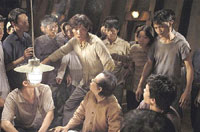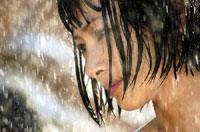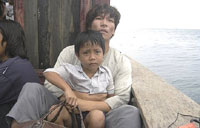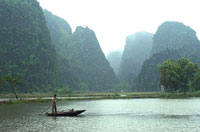What is beautiful? An impressive skyline? The embrace of a long-lost family member? A pretty woman singing a love song? A country with lush, rolling landscapes? Or one where hope is offered to all? One of the strengths of The Beautiful Country is its ability to ask about and challenge our notion of beauty—and ugliness. This nuanced, yet ambitious-in-scope movie shows us both in the most unlikely places.

For main character Binh (Damien Nguyen), life has been anything but beautiful. As a young Vietnamese man whose mother is a native and whose father was an American G.I., his culture labels him bui doi, “less than dust.” He’s raised by his extended family with little love and much ridicule in a quiet rural village. He has little knowledge of his parents’ whereabouts, or even if they’re alive. When a marriage in the family brings a new man to the house, Binh is ousted and his grandmother suggests he go to Saigon to search for his mother, whom she finally reveals is still alive.
Thus begins a long journey of discovery for Binh, a downtrodden outsider who literally doesn’t fit in his culture due to the height he must have inherited from his American father. His first discovery is a half-brother, Tam (Tran Dang Quoc Thinh), a plucky young boy whose youthful exuberance amidst poverty is a needed breath of fresh air in this sobering tale. Binh finally meets his mom, a humble housekeeper of a rich Vietnamese family, in a dingy alleyway. His simple proclamation, “It’s me,” is followed by a wordless scene that’s utterly moving in its understated flood of emotion.

A freak accident makes this reunion short-lived, and Binh is forced to take Tam and flee to America to search for his father. This journey is fraught with much difficulty and pain—in the belly of big boats overstuffed with refugees and short on food, cleanliness, and safety. There’s a stay in a Malaysian refugee camp partway through their trek, where Binh and Tam are assigned a tiny holding space to call home. In this awful place (one of their “neighbors” greets them, “Welcome to hell!”), they meet Ling (Bai Ling), a pretty Chinese refugee who uses her beauty like currency to help the three of them escape to the next leg of their harrowing journey.

When they finally reach the shores of the U.S., I’m reminded of the feeling you get when you travel to another culture and return home with different eyes. The towering buildings, “We Buy Ugly Houses” and “Fly the Friendly Skies” billboards, and constant blaring of pop tunes at practically every turn in America seem altogether silly when placed alongside Binh’s life and losses and longings. We’re given just enough glimpses of American culture—a clip from the movie Wall Street, an A-Ha song playing in a smoky café, suited businessmen in a karaoke bar—to draw our own conclusions about their relative beauty or ugliness, importance or triviality. Additionally, throughout Binh’s travels we see stunning portraits of loss and perseverance, the plight of refugees, the longing to belong, the intoxicating nature of hope, the ripple effects of tragedy and war, the redemption of a father’s love. Thankfully, none of these portraits or questions are in-your-face, but are offered with nuanced performances and sparse dialogue. The ending isn’t a typical Hollywood father-son reunion, but is much more subtle, realistic, and meaningful.

Before reaching the shores of the U.S., a shady ship captain (Tim Roth) in a rare moment of honesty tells Binh, “You’ll always be out of place.” In fact, so much is seemingly out of place throughout the movie. In the opening scenes, a quiet Vietnamese village is interrupted when a bicycle driver with a booming radio rides through. Later, forlorn, introspective Binh seems out of place in bustling New York City. In the refugee camp, a group of poor, displaced children find joy in an impromptu mudslide when a pipe breaks. Ling, arguably one of the prettiest sights in the movie, admits she’s “already dead inside.” Many physically disfigured or cultural outcasts find endearing kinship with one another. Beauty and ugliness intermingle often throughout the film, blurring the lines and challenging the definitions of the two.
Some of the most startling and stifling ugliness is that which several main characters perceive in themselves. We see how it prevents them from giving and receiving love, from reaching for their heart’s desires. And because of that, the most stunning beauty comes in human connections, physical touch, longed-for belonging, unconditional acceptance, familial love. In short, we see the most compelling beauty in the treacherous and tender terrain of the human heart.
Talk About It
Discussion starters- What character, scene, or moment was the most beautiful in your opinion? Which was the most ugly? How would you define beauty and ugliness in light of this movie?
- Trace the theme of feet and shoes throughout the movie. What do you think the writers/producers were trying to communicate with this continuing theme?
- Self-imposed feelings of ugliness hold several of the characters back. Do you have any feelings of ugliness about yourself that are negatively affecting you?
- List the “outsiders” in the film. Have you ever felt like an outsider? Why? How did you handle that? Are there outsiders in your community you could reach out to?
- Many of the refugees carry all their earthly possessions ashore in a small bag. Obviously most of us in the U.S. have far more stuff than that. How does this challenge your purchasing habits? Do you currently have some things you could give away to a shelter or mission in your community?
The Family Corner
For parents to considerThough there’s very little bad language and no nudity, due to the sobering themes, this isn’t a film for kids. Prostitution is implied. Drug use and gambling are shown. Family members die. You might consider taking mature, social-action-oriented older teens.
Photos © Copyright Sony Pictures Classics
Copyright © 2005 Christianity Today. Click for reprint information.
What Other Critics Are Saying
compiled by Peter T. Chattawayfrom Film Forum, 08/04/05Another film making the rounds off the beaten path is The Beautiful Country , about a young Vietnamese man who searches for his birth parents—a Vietnamese woman and a former American G.I. This search takes him through a maze of cultural tensions.
Mainstream critics seem to think the film is beautiful indeed.












